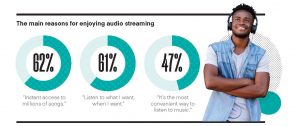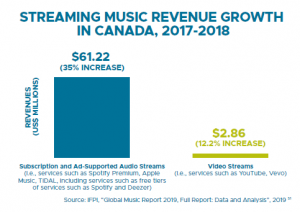On the latest episode of the popular podcast Musonomics, Music Canada President and CEO Graham Henderson, along with Miranda Mulholland, artist, label owner, festival founder and Chair of Music Canada’s Advisory Council, spoke with host Larry Miller about some of the major issues affecting the music industry today.
 Musonomics is a twice-monthly podcast about the business of the music and culture industries. Hosted by Larry Miller and produced with support from the NYU Steinhardt Music Business Program, the program uses data, music and interviews with newsmakers and analysts to provide insight into what’s happening now — and what’s coming next in the world of music and beyond.
Musonomics is a twice-monthly podcast about the business of the music and culture industries. Hosted by Larry Miller and produced with support from the NYU Steinhardt Music Business Program, the program uses data, music and interviews with newsmakers and analysts to provide insight into what’s happening now — and what’s coming next in the world of music and beyond.
In the podcast, Miller explores data contained in IFPI’s recent ‘Music Listening 2019’ report, which provides a comprehensive overview of music consumption trends from around the world. As Miller notes, global music listening continues to rise, with respondents reporting their listening habits being up to 18 hours per week. Engagement with audio streaming services also remains strong, with 64% of all respondents using a streaming service in the past month.
Troublingly, the report also highlights the growing scale of listening via user-upload services – the greatest contributor to the Value Gap. Indeed, 77% of respondents reported using YouTube for music listening in the last music; globally, on-demand consumption via video streaming totalled 47%, dwarfing paid and ad-supported audio streaming services. The episode, entitled Mind the (Value) Gap, explores this very issue – a phenomenon that IFPI has called the biggest threat to the future sustainability of the music industry.
During the episode, Henderson touches on the origin of the issue, describing the Value Gap as the result of a failure of legislation to keep pace with the changes in technology. The impact of this phenomenon has created a widening gulf between the growing revenues that platforms and user-upload services like YouTube gain from the existence of music on their services, and the value returned to the artists and labels who created and developed this creative content.
Henderson also outlines how outdated exemptions such as broad safe-harbour laws have prevented copyright creators and owners from being able to ensure that their work is not being commercialized without their consent by digital and online services. Indeed, as Mulholland vividly describes during the episode, no group has been as adversely affected by the Value Gap as artists.
Mulholland goes on to speak about the realities of working as an artist working within a framework where it is almost impossible to obtain fair remuneration for the monetization of one’s work on online platforms such as YouTube. She outlines how exemptions within Canadian copyright legislation has created this system: where musicians are effectively subsidizing technology companies, while – at the same time – receiving royalty payouts that are too meagre to subsist on alone.
To hear the rest of this fascinating discussion, you can find the episode on Apple Podcasts, SoundCloud, and other major podcasting services.
Larry Miller will also be delivering a keynote address at Music Canada’s 2019 Symposium, taking place on Wednesday October 23rd. In his address, Miller will share insights from his 2019 report, Same Heart. New Beat. How Record Labels Amplify Talent in the Modern Music Marketplace, which examines the partnerships between record companies and artists. In particular, it outlines the evolution of label efforts to discover and market musical artists; how marketing plans differ and enhance opportunities for artists in a streaming world; the increasing role of data in label strategies; approaches undertaken by labels to build artist branding, and more. Miller will also reconnect with Mulholland and Henderson in a fireside chat following his keynote.











Music Canada